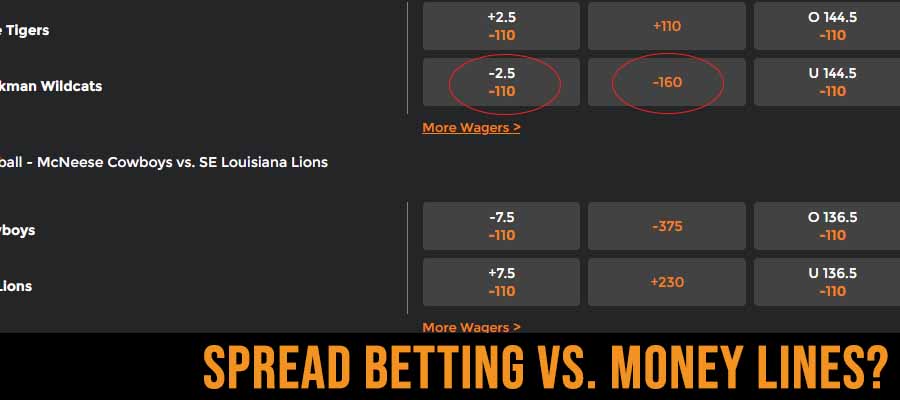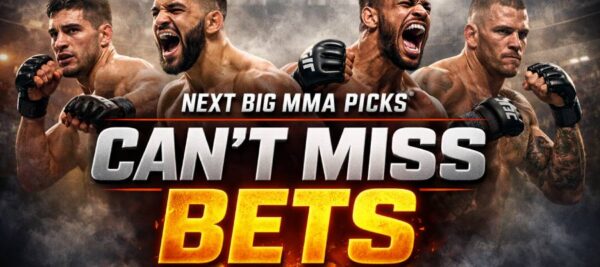In sports betting, two of the most popular wager types are moneyline and point spread bets, so that’s the reason for this post: Spread vs Moneyline?
At the core, a moneyline bet is a straight-up wager on which team will win, regardless of the score.
On the other hand, spread betting evens out the odds by assigning a point margin that the favorite must overcome or the underdog must stay within.
Your choice between spread or moneyline betting depends on your strategy, risk tolerance, and how you analyze matchups.
Learning the difference helps you make sharper bets and avoid common pitfalls.
Betting on Moneyline focuses on picking the outright winner of a game, while spreads involves betting on the margin of victory.
Which bet is better depends on your strategy and even the type of event, it is a simpler moneyline bet or a spread betting offering higher payouts.
Learn how to bet on point spread vs. moneyline betting and the advantages that come with both options.
Spread vs Moneyline? MyBookie Teaches You When Are They the Best Bet
Sports Betting 101: Learn the Difference Between Spread and Moneyline!
How to Bet on Sports | MyBookie wants you to be a better gambler with our Sports Betting Guide
Table of Contents: Spread Betting vs. Money Lines
What Betting Type Will Be Your Next Bet: Spread Betting vs. Money Line?
What is Sports Betting?
What is Moneyline Betting?
What is a Point Spread Bet?
Which Bet is Better?
Answering Common Questions About Spread Betting vs. Moneyline Betting
Understanding When to Bet on Money Line
How Point Spread Betting Works
Key Phrases Explained
When to Bet Spread vs. Moneyline
Pros and Cons of Moneyline vs. Spread Betting
Conclusion
What Betting Type Will Be Your Next Bet: Spread Betting vs. Money Line?
Sports betting offers many ways to wager on games, but two of the most popular methods are moneyline betting and spread betting.
Both bet types have their advantages, and understanding when to use each can help bettors make smarter decisions.
The moneyline is a straightforward bet on which team will win, while spread betting introduces a point handicap to balance the odds.
Choosing the right type of bet depends on factors like team strength, expected game outcome, and potential payout.
For beginners, moneyline betting is easier to understand because it only requires picking a winner.
However, spread betting often provides better value, especially when betting on favorites.
Knowing the difference between these two bets can make a big impact on your overall success.
This guide breaks down moneyline vs. spread betting, explains when to use each, and answers common questions to help you bet with confidence.
^ TopWhat is Sports Betting?
Sports betting is the act of wagering on the outcome of a sporting event.
It has been around for decades and is now more popular than ever, thanks to online sportsbooks.
Bettors can place different types of bets, but two of the most common are moneyline bets and spread bets.
Each bet type has its own advantages, and knowing when to use each is important for successful betting.
Sports betting odds are created by oddsmakers who evaluate factors like team performance, injuries, and public perception.
These odds help set the betting lines, making games more competitive from a wagering perspective.
Bettors should always compare odds across different sportsbooks to find the best value before placing their bets.
^ TopWhat is Moneyline Betting?
Moneyline betting is the simplest form of online sports betting.
You are betting on which team will win the game outright.
Does not matter how many points they win by—just that they win.
If your chosen team wins, you win your bet.
If they lose, you lose your wager.
Moneyline odds are displayed with a plus (+) or minus (-) sign:
- A negative number (-) means the team is the favorite.
You need to risk more money to win less. - A positive number (+) means the team is the underdog and smaller bet wins more if the underdog wins.
For example, if the Patriots are -150 and the Jets are +130, you would need to bet $150 to win $100 on the Patriots.
A $100 bet on the Jets would win $130 if they pull off the upset.
Moneyline bets are great when betting on underdogs or when you are confident in a favorite winning but don’t want to worry about the spread.
What is a Moneyline Bet?
So, how does moneyline work? In layman’s terms, money line betting simply entails choosing a team or player that you feel is likely to end the game on the winning side.
Money lines usually come with odds that have the favorites with a negative (-) sign in front of the lines and the underdogs represented by a positive sign (+), as is depicted below.
- Boston Celtics -150
- Milwaukee Bucks +130
An example of how a moneyline bet works:
Here, the Celtics are the favorites, you need to bet $150 to win $100 (plus your $150 back).
The Bucks are the underdogs, so if you bet $100, win $130 (plus your $100 back).
The moneyline simply means you’re betting on which team will win outright, without any point spread.
Moneyline Betting Examples
So, what is a moneyline bet in practical terms?
Let’s say the Yankees are -150 against the Red Sox at +130.
A -150 moneyline means you must bet $150 to win $100 on the Yankees.
If you back the underdog Red Sox at +130, a $100 bet would return $130 in profit.
Understanding how does moneyline odds work is crucial to identifying value.
Favorites cost more to back but have a higher probability of winning, while underdogs pay more but win less frequently.
Explain moneyline betting by always focusing on the risk-to-reward ratio.
What Does It Mean to Bet the Moneyline?
Many beginners ask, “what does it mean to bet the moneyline?” or even, “what is ML in betting?” (ML stands for moneyline).
It’s the simplest form of betting: choose the winner, no point spreads or score considerations involved.
To bet the moneyline, you pick a team or individual to win outright.
Odds can be positive (underdog) or negative (favorite), and how to win a moneyline bet comes down to picking the victor and managing your stake to match the payout formula.
A solid moneyline betting strategy involves finding favorites at low risk or underdogs with high potential value.
^ TopWhat is a Point Spread Bet?
Now, let’s dive into understanding spread betting.
The point spread adds a layer of challenge.
Instead of just picking the winner, you predict whether a team will cover the spread—either by winning by a certain number of points or not losing by too much.
Example: The Chiefs are -6.5 favorites against the Raiders.
If you back the Chiefs, they must win by 7 or more.
If you back the Raiders at +6.5, they must lose by 6 or fewer—or win outright.
So, what does cover the spread mean? It means a team met expectations set by the oddsmakers.
This balances the action on both sides of the bet.
What is Spread Betting?
Spread betting is different from moneyline betting because it introduces a point handicap to level the playing field.
This means you’re not just betting on who wins, but also by how much they win or lose.
Oddsmakers set a spread to encourage equal betting on both teams.
- A negative spread (-) means the team is the favorite and must win by more than the listed number.
- A positive spread (+) means the team is the underdog and can lose by less than the listed number (or win outright) for a successful bet.
For example, if the Chiefs are -6.5 vs. the Bills, they must win by 7 or more points for the bet to win.
If you bet on the Bills +6.5, they can lose by 6 points or less, or win the game outright, for your bet to win.
Spread bets often offer better odds for favorites than moneyline bets, making them a good option when a favorite is expected to win by a large margin.
Why Is There a Half-Point in Spread Bets?
Ever notice a spread like -3.5 instead of -3?
That half-point—also called the “hook”—is designed to avoid ties, known as “pushes.”
For example, if the Cowboys are -3.5 and win by 3, bettors who took the favorite lose.
That half-point ensures a clear result, adding more risk or edge.
Using spread bet examples, you’ll quickly see how impactful that .5 can be.
It’s often the difference between a win and a refund.
What Does ‘Against the Spread’ Mean?
When people talk about betting against the spread, they mean picking a team with the handicap.
You’re not betting on them to win outright, but to outperform the oddsmaker’s point margin.
What does against the spread mean? It reflects how a team performs relative to expectations—not just wins or losses.
Many professional bettors prefer this metric to evaluate teams over the course of a season.
^ TopWhich Bet is Better?
Both moneyline and spread betting have their advantages.
The choice depends on your risk tolerance and how confident you are in the team’s ability to win outright or cover the spread.
- Moneyline bets are safer for favorites but may require betting more money for a smaller payout.
- Spread bets offer better odds but add risk, as teams must win or lose within a specific range.
- Underdogs can be more profitable on the moneyline if they win outright, while spread bets give them a cushion to cover.
Smart bettors analyze matchups, injuries, and recent performance before deciding which type of bet to place.
^ TopAnswering Common Questions About Spread Betting vs. Moneyline Betting
What is the Difference Between Spread and Moneyline Betting?
The key difference is how the bet is won.
- Moneyline betting is straightforward—you pick the winner, and if they win, you win.
- Spread betting requires a team to cover a point handicap, meaning they must win by a certain margin or avoid losing by too much.
For example, a -200 moneyline favorite might also have a -5.5 spread.
If you bet the spread, the team needs to win by at least 6 points for the bet to win.
If they only win by 3 points, the moneyline bet would still win, but the spread bet would lose.
When Should You Bet the Spread vs. Moneyline?
The right choice depends on how you expect the game to play out.
- Bet the moneyline when you are confident a team will win but unsure about the margin.
This is best for games expected to be close. - Bet the spread when you believe a favorite will win comfortably or an underdog can keep it close.
For example, if the Eagles are -7.5 against the Giants, a spread bet means they must win by at least 8 points.
If you think the Giants can keep it close, betting them +7.5 is a good option.
Why Do Spread Bets Have Better Payouts?
Spread bets are riskier because they require teams to win by a specific margin.
Sportsbooks use spreads to balance betting action, making both sides of a bet more appealing.
For example:
- A -200 moneyline favorite means you must bet $200 to win $100.
- The same team at -5.5 on the spread might be offered at -110 odds (bet $110 to win $100).
Since spread bets are harder to win, they offer better payouts compared to moneyline bets on heavy favorites.
Is It Better to Bet Spread or Moneyline on Underdogs?
Underdogs provide higher payouts on the moneyline but are safer on the spread.
- If you believe an underdog can win outright, bet the moneyline for a bigger payout.
- If you think they will keep it close but not win, bet the spread for a safer bet.
For example, if the Jets are +7 vs. the Bills, betting them +7 means they can lose by 6 points or less and still win your bet.
But if you think they will win the game outright, a +250 moneyline bet is a better choice.
What Happens If a Spread Bet Pushes?
A push occurs when the final score lands exactly on the spread.
For example, if you bet Packers -3 and they win 27-24, your bet is refunded.
This is why many sportsbooks add half-points (.5) to spreads to prevent pushes.
Is It Better to Bet Spread or Moneyline?
Both money line and spread betting can be used separately or complementing each other, depending on the situation at hand.
Once you understand the value that comes with betting on the two options in the various sporting events, you will be in a better position to understand and decide which betting strategy to use at any given time.
^ TopUnderstanding When to Bet on Money Line
With the Celtics still at -150 and the Bucks at +130, the inference is that you have to bet $150 on Boston to win $100 (if the Celtics win the game) and bet $100 on Milwaukee to win $130 (if the Bucks win the game).
In soccer, there is usually a slight variation on the odds, typically known as 1X2.
The soccer lines usually have three options to choose from: home win (1), away win (2) and draw (X).
Since all you need to be concerned with in money lines is the winning side, it is best to avoid picking a team whose winning chances don’t look good.
The best time to bet on a money line for maximum profits is.
When you have underdogs who look strong enough to win the game because the return on investment is higher than when betting on a favorite or even putting your money on a point spread.
Typically, strong home underdogs make the best picks for money lines, especially in team sports that have a lot of parity and strong home advantages such as college basketball, the NFL and the NBA.
^ TopHow Point Spread Betting Works
Generally, point spread betting is what odds makers use to define how much better one team is considered to be over its opponent.
If a bettor or handicapper is talking about trying to get the best of the number or points, they are most likely referring to the spread.
If, for example, the New England Patriots are expected to beat the Tampa Bay Buccaneers by a touchdown, the point spread will represent that advantage by favoring the Patriots by 7 points—represented as -7 in point spread for New England or +7 for Tampa Bay.
In games like Soccer and hockey where goals come at a premium, a half point on the spread will most likely make a huge difference between a winning and losing bet.
When talking about NFL, for example, a half point is generally valued around 5-10 cents.
In soccer, the value can go as high as being worth 100. If you are good at handicapping such low-scoring games, spread betting can be very profitable for you.
When to Bet on Point Spreads Instead of Moneyline
The other time that offers a best option for point spread betting is when the price for money line betting looks too steep or risky for you.
For example, rather than bet -400 on a heavy favorite, you can alternatively wager on -3.5 on the spread, laying only -110 in the process.
Bet on point spreads instead of the moneyline when you’re confident a favorite can cover the spread or when you want better odds backing an underdog to keep the game close.
^ TopKey Phrases Explained
Spread vs. Moneyline: What’s the Best Choice?
It depends on the situation:
- Moneyline bets are simpler but often pay less.
- Spread bets offer better value but require teams to cover the point difference.
What’s the Difference Between Spread and Moneyline?
A moneyline bet wins if your team wins outright.
A spread bet requires them to win or lose within a specific point range.
Should You Bet the Spread or Moneyline in Football?
For NFL and college football, spread betting is more popular because games often have large point differences.
Moneyline bets are safer for underdogs but pay less for favorites.
What is a Better Bet: Moneyline or Spread in Basketball?
NBA and college basketball games can be high-scoring, making spread betting more profitable.
Moneyline bets are better for close games or strong underdogs.
How Do You Decide Between Betting Spread vs. Moneyline?
- Bet the moneyline if you just need a team to win.
- Bet the spread for better odds on favorites.
- Bet the spread on underdogs if they can keep it close.
- Compare odds and risk before placing bets.
When to Bet Spread vs. Moneyline
Both bet types have advantages.
Moneyline bets are simpler but often require bigger wagers for small payouts.
Spread bets offer better odds but add risk.
- Use moneyline bets for safe picks or underdogs with upset potential.
- Use spread bets for better odds on favorites or when expecting a close game.
Smart betting requires research, strategy, and an understanding of both bet types.
By knowing when to use each, you can make more informed bets and maximize your winnings
^ TopPros and Cons of Moneyline vs. Spread Betting
When comparing point spread vs moneyline bets, both offer advantages:
Moneyline Pros:
• Simpler to understand
• No need to worry about the margin of victory
Moneyline Cons:
• Lower returns on favorites
• Underdogs less likely to win
Spread Pros:
• Balanced odds regardless of matchup
• Better value in close games
Spread Cons:
• Requires accurate score predictions
• Hook risks (half-points) can hurt outcomes
Still asking, “is it better to bet spread or moneyline?”
It depends on your game knowledge, risk appetite, and analysis of the matchup.
^ TopConclusion
In the spread vs moneyline debate, neither is inherently superior.
Each suits different betting scenarios.
Understanding the difference between moneyline and spread allows you to bet smarter.
Sometimes, combining both can be effective—for example, betting the moneyline and spread on the same team if you believe in a strong performance.
Whether you’re using spread + vs – tactics or diving into what is spread total and moneyline, success comes down to reading the market, recognizing value, and placing bets accordingly.

MyBookie’s Sportsbook Betting Guide | Betting on Sports
Now that you’ve got the basics of sports betting down, dive deeper into strategies and tips with MyBookie’s Betting Guide.
It’s time to enhance your betting knowledge and make smarter decisions when placing wagers on your next game!
- Spread Betting Tips
- Sports Betting Guide: Spread vs Money Line
- Playing Difference of Point Spread vs. Moneyline Sportsbetting
- Wagering on Moneyline or Straight Up Bets
- Five Questions You Should Ask Yourself When Betting On Sports
- Determining Betting Impact Of Injured Players: Betting Guide
- Betting Non-Marquee Sports NASCAR, Golf, Tennis, WNBA
- What Is Implied Probability In Online Betting?
- All About Sweetheart Teasers The Good, Bad and Ugly
- Introduction To Bankroll-Boosting Pleaser Bets
- Keys To Disciplined And Profitable Betting
- Picking Sexiest Cheerleading Squads in American Sports
- Analysis of Understanding Of Player Props
- Betting On Draws Strategy Explanation
- Betting on Draws
- The Keys To Developing A Winning Mindset
- Key Numbers In Sports Betting
Sports Betting Odds
Betting Online Casino
| Playing Blackjack or Poker |
| Understanding Live Casino |
| Best Casino Online Games |
Sportsbook Odds | Online Betting
^ Top




